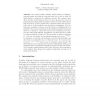Free Online Productivity Tools
i2Speak
i2Symbol
i2OCR
iTex2Img
iWeb2Print
iWeb2Shot
i2Type
iPdf2Split
iPdf2Merge
i2Bopomofo
i2Arabic
i2Style
i2Image
i2PDF
iLatex2Rtf
Sci2ools
TCC
2010
Springer
2010
Springer
Almost Optimal Bounds for Direct Product Threshold Theorem
Abstract. We consider weakly-verifiable puzzles which are challengeresponse puzzles such that the responder may not be able to verify for itself whether it answered the challenge correctly. We consider k-wise direct product of such puzzles, where now the responder has to solve k puzzles chosen independently in parallel. Canetti et al have earlier shown that such direct product puzzles have a hardness which rises exponentially with k. In the threshold case addressed in Impagliazzo et al, the responder is required to answer correctly a fraction of challenges above a threshold. The bound on hardness of this threshold parallel version was shown to be similar to Chernoff bound, but the constants in the exponent are rather weak. Namely, Impagliazzo et al show that for a puzzle for which probability of failure is δ, the probability of failing on less than (1− γ)δk out of k puzzles, for any parallel strategy, is at most e−γ2 δk/40 . In this paper, we develop new techniques to bound ...
| Added | 17 Mar 2010 |
| Updated | 17 Mar 2010 |
| Type | Conference |
| Year | 2010 |
| Where | TCC |
| Authors | Charanjit S. Jutla |
Comments (0)

